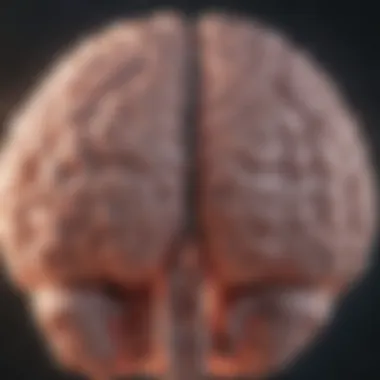Understanding Menopause Brain Fog: Causes and Solutions


Intro
Menopause is a natural phase in a woman's life, marking the end of menstrual cycles and fertility. However, it also brings significant physiological changes, causing various symptoms. One particularly troubling aspect is the phenomenon often referred to as menopause brain fog. This term encompasses a range of cognitive challenges that many experience during this transition. Understanding these challenges is crucial for those affected, as well as for health professionals who support them.
Brain fog can manifest in numerous ways, including forgetfulness, difficulty concentrating, and mental fatigue. There is increasing recognition that hormonal fluctuations during menopause play a critical role in these cognitive changes. However, the relationship is complex and not yet fully understood, necessitating a thorough investigation into this topic.
This article aims to explore menopause brain fog in depth, focusing on definitions, causes, symptoms, and implications, as well as coping strategies. By delving into recent studies, readers will gain a clearer understanding of this phenomenon and potential ways to manage it effectively.
Foreword to Menopause Brain Fog
Understanding menopause brain fog is critical for recognizing how menopause affects cognitive functions. This section highlights its significance, explores defining aspects, and delves into contextual elements impacting women during this transitional life phase.
Defining Brain Fog
Brain fog refers to a state of mental cloudiness that can hinder precise thought, concentration, and memory. It is often described by those experiencing it as a sensation of confusion, forgetfulness, and a lack of mental clarity. The term encompasses a complex array of cognitive difficulties, which can make routine tasks feel more challenging. Scientifically, brain fog might not be a formally recognized medical condition, but the experiences associated with it are valid and impactful.
Lab studies indicate that brain fog can be influenced by several factors, including hormonal fluctuations, stress, and sleep quality. Though subjective, these cognitive challenges require attention and understanding to improve quality of life.
The Context of Menopause
Menopause marks a significant juncture in a woman’s life. Typically occurring in their late 40s to early 50s, menopause signals the end of reproductive capability. During this time, hormonal changes, primarily the decline in estrogen and progesterone, result in various physical and mental changes.
This transition impacts not only physical health but also cognitive well-being. Women may find themselves facing disruptions in memory, focus, and overall cognitive functioning. Acknowledging these changes provides insight into the broader experience of menopause.
It's essential to differentiate between normal age-related cognitive changes and those exacerbated by menopause. Awareness of these distinctions can help in identifying effective coping strategies. Improved understanding contributes to better interpersonal dialogues about women's health, fostering a more supportive environment for those undergoing these changes.
Understanding both definitions of brain fog and the context of menopause can empower women to seek support and solutions during this transitional phase.
The exploration of these elements prepares the reader for deeper insights into the physiological changes during menopause.
Physiological Changes During Menopause
The phase of menopause brings about profound changes in a woman's body. Understanding these physiological changes serves as a fundamental aspect in discussing menopause brain fog. The body undergoes a series of shifts, primarily due to changes in hormone levels, which have significant implications for cognitive functions. This section delves into the key elements of these physiological changes, their direct effects on cognition, and the importance of recognizing these transformations.
Hormonal Fluctuations
Menopause is characterized by a notable decline in estrogen and progesterone levels. This fluctuation is not just a hormonal issue; it directly affects brain function. Estrogen is known to influence neurotransmitter systems and brain plasticity, which are crucial for memory and cognitive performance. As estrogen levels diminish, many women report challenges with focus, clarity, and memory—hallmarks of what is commonly referred to as brain fog.
Research indicates that lower estrogen levels may lead to a reduction in serotonin, a neurotransmitter closely associated with mood regulation and cognitive functions. This connection explains why hormonal changes during menopause can produce not only cognitive challenges but also emotional fluctuations.
"Understanding the link between hormonal changes and cognitive functions sheds light on many experiences women face during menopause."
Neurotransmitter Alterations
Along with hormonal shifts, the decrease in estrogen during menopause can cause alterations in various neurotransmitters. This change can affect communication between neurons, leading to issues in attention and memory. Neurotransmitters such as dopamine and acetylcholine are significantly impacted.
Dopamine is critical for concentration and motivation, while acetylcholine plays a pivotal role in memory creation and retrieval. A decrease in these neurotransmitters may explain the memory impairments and attention deficits that many women report during this transitional period.
In summary, recognizing the intricate relationship between hormonal fluctuations and neurotransmitter alterations is essential in understanding the cognitive challenges posed by menopause. Being informed about these physiological changes provides a foundation for seeking effective coping strategies and interventions.
Cognitive Effects Associated with Menopause
The cognitive effects observed during menopause represent a significant area of concern for many individuals experiencing this natural life phase. These effects, often categorized under terms like brain fog, can include a variety of challenges in memory, attention, and overall cognitive function. Understanding these cognitive effects is crucial for addressing the needs of those affected and guiding them towards effective management strategies.
Memory Impairment


Memory impairment is a frequently reported symptom associated with menopause, often experienced as forgetfulness or difficulty in recalling information. Research indicates that hormonal changes, particularly the fluctuations in estrogen levels, play a vital role in this cognitive decline. Estrogen has been shown to have neuroprotective effects on the brain; therefore, its reduction can lead to difficulties in forming and retrieving memories. This impairment may manifest in various ways, such as misplacing items, forgetting appointments, or struggling to remember recent conversations. For some, this can create anxiety and frustration, reinforcing the importance of addressing these symptoms promptly.
Attention Deficits
Attention deficits during menopause can disrupt daily life and impact overall productivity. Many individuals report challenges in concentrating, which can be attributed to hormonal fluctuations as well as accompanying stressors during this life stage. The decline in estrogen may influence neurotransmitter systems, particularly those responsible for attention and focus. This transient difficulty in maintaining attention can have broader implications, including challenges in professional settings and personal relationships. Recognizing these deficits is essential for those affected to create strategies that minimize distractions and enhance concentration.
Executive Function Challenges
Executive function represents a suite of cognitive processes crucial for goal-directed behavior, including planning, organization, and decision-making. Menstrual transitions can adversely affect these abilities, leading to disorganization or feeling overwhelmed by tasks. Individuals may find that their capacity to manage multiple responsibilities diminishes, which can lead to increased frustration. Research shows that this change is often linked to alterations in both hormonal balance and brain chemistry. Effectively addressing these challenges requires acknowledging their presence and implementing coping strategies, such as breaking tasks into smaller steps and prioritizing activities.
Understanding cognitive effects related to menopause is essential. It promotes awareness and aids in formulating effective coping mechanisms for those impacted by these changes.
Identifying Symptoms of Menopause Brain Fog
Identifying the symptoms of menopause brain fog is crucial for several reasons. Firstly, understanding these symptoms allows individuals to recognize what they are experiencing. Menopause affects cognitive functions, leading to confusion and memory issues. Acknowledging these changes can help women seek relevant support and effective coping strategies. This section focuses on the common experiences related to menopause brain fog and how symptoms may differ among individuals.
Common Experiences
Many women report a range of cognitive symptoms during menopause. Some of the most frequently noted experiences include:
- Memory loss: Forgetting names, appointments, or where things are placed.
- Difficulty concentrating: Finding it hard to focus on tasks at hand.
- Mental fatigue: Feeling mentally exhausted even after minimal cognitive effort.
- Word retrieval issues: Struggling to find the right words during conversations.
These experiences can affect day-to-day functioning, leading to frustration and social withdrawal. Moreover, they can impact personal and professional relationships. Identifying these experiences is a vital step in understanding the broader picture of menopause and cognitive health.
"Recognition of symptoms is the first step towards managing the effects of menopause brain fog."
Variability Among Individuals
It is important to recognize that symptoms of menopause brain fog can vary widely from one individual to another. Factors that contribute to this variability include:
- Genetic predisposition: Each person's genetic makeup can influence how their brain ages and reacts to hormonal changes.
- Lifestyle factors: Diet and exercise play significant roles in cognitive health. Women who prioritize physical health may experience fewer cognitive complaints.
- Duration of menopause: The length and intensity of menopausal symptoms can affect cognitive functions, especially in women who are more sensitive to hormonal fluctuations.
- Mental health history: A past history of anxiety or depression can exacerbate cognitive symptoms during menopause.
By understanding that experiences vary, women can avoid feelings of isolation or doubt regarding their symptoms. This knowledge encourages seeking tailored support and resources based on individual needs.
Recognizing the wide spectrum of menopause brain fog symptoms helps foster a sense of community and shared experiences, ultimately leading to better management and understanding.
Potential Triggers for Brain Fog
In understanding menopause brain fog, identifying potential triggers can be a crucial aspect. This knowledge isn't just academic; it's practical and essential for managing symptoms. Various factors can aggravate cognitive issues during menopause. Recognizing these influences helps individuals develop personalized strategies to cope and mitigate the effects of brain fog.
Sleep Disturbances
Sleep disturbances are a prevalent issue during menopause. Many women experience insomnia or interrupted sleep patterns due to hormonal changes. Lack of quality sleep can lead to increased fatigue, affecting concentration and memory. Research indicates that individuals with sleep disturbances report higher instances of cognitive difficulties. Thus, prioritizing good sleep hygiene becomes critical. Establishing a consistent sleep schedule, creating a comfortable sleep environment, and avoiding screen time before bed can significantly enhance sleep quality.
"Quality sleep is foundational to cognitive function, especially during the menopausal transition."
Stress and Emotional Factors
Stress and emotional health play significant roles in exacerbating menopause brain fog. Women may face various emotional challenges during this period, such as mood swings or anxiety. These emotional fluctuations can impair cognitive functions. Moreover, chronic stress affects the brain's ability to function efficiently. Engaging in stress-reduction techniques like yoga, meditation, or deep-breathing exercises can be beneficial. Addressing emotional well-being not only improves overall health but also alleviates cognitive symptoms related to menopause.
Dietary Considerations
Diet has a direct impact on cognitive health, making it an important factor to consider. Nutritional deficiencies can lead to cognitive decline. Diets lacking essential nutrients like Omega-3 fatty acids, vitamins B and D, and antioxidants may worsen brain fog. A well-balanced diet, rich in fruits, vegetables, whole grains, and healthy fats, supports cognitive function. Regular hydration is also crucial for maintaining clarity and focus. Staying mindful of dietary habits can help manage brain fog and improve overall mental well-being.
In summary, recognizing potential triggers such as sleep disturbances, stress, and diet can empower individuals. By addressing these factors, it is possible to alleviate some of the cognitive challenges associated with menopause brain fog.
Research Findings on Menopause Brain Fog


Research into menopause brain fog is crucial for understanding how cognitive function changes during this phase in women's lives. The experience of brain fog can be disorienting and troubling. By integrating empirical studies into this discourse, we deepen our grasp of the mechanisms behind these cognitive shifts.
Several studies have focused on the hormonal changes that occur during menopause and their direct relationship with cognitive performance. For many women, this phase includes a noticeable decline in memory, difficulty concentrating, and impaired executive function. Understanding these research findings helps to identify possible interventions and coping strategies that can alleviate symptoms.
Recent Studies and Their Implications
Recent studies have shown that the relationship between menopause and cognitive impairment is multifaceted. A significant study published in The Journal of Clinical Endocrinology & Metabolism highlights that post-menopausal women experience marked declines in verbal memory and processing speed. This decline can be attributed largely to estrogen depletion, which has vital roles in neurotransmitter regulation and neuroprotection.
Furthermore, a systematic review in Menopause: The Journal of The North American Menopause Society emphasizes the need to consider individual variability. Factors such as genetics, lifestyle, and even pre-existing health conditions can influence how menopause affects brain function. Understanding this can foster personalized approaches in diagnosing and managing brain fog.
"Understanding the relationship between cognitive function and hormonal changes during menopause is essential for developing effective interventions."
The implications of these findings extend to both clinical practices and personal health management strategies. Women become empowered with knowledge, can better articulate their experiences to healthcare providers, and advocate for appropriate treatments or therapies.
Challenges in Research Methodology
Despite the wealth of information from studies, challenges in research methodology persist. One primary issue is the variability in study designs and sample populations. Many studies do not account for the diverse experiences of menopause. For instance, the age range of participants can skew results.
Another challenge is the assessment tools used. Some studies rely on self-reported questionnaires, which can be subjective and influenced by social or psychological factors. Further complicating the matter, the lack of longitudinal data makes it difficult to track changes over time. This can lead to inconclusive findings.
Addressing these challenges is paramount for future research. Improved methodologies, such as larger sample sizes, longer follow-ups, and more objective cognitive assessment tools, can provide a clearer picture of menopause brain fog.
As ongoing research unfolds, it holds the promise of unveiling deeper insights into how to better support women navigating this significant life transition.
Coping Strategies for Menopause Brain Fog
Addressing menopause brain fog effectively requires a multifaceted approach. Understanding coping strategies is crucial not only for alleviating symptoms but also for enhancing the quality of daily life. These strategies aim to counteract the cognitive decline associated with hormonal changes, thereby fostering better mental clarity and emotional well-being. Individuals need to acknowledge their experiences and seek practical solutions that resonate with their lifestyle and preferences.
Lifestyle Modifications
Lifestyle modifications play a vital role in managing the effects of menopause brain fog. Simple changes in daily habits can lead to significant improvements in cognitive function. Here are several key modifications:
- Regular Exercise: Engaging in consistent physical activity is essential. Exercise boosts blood flow to the brain, which can enhance memory and overall cognitive function. Activities like walking, swimming, or yoga can be particularly beneficial.
- Balanced Diet: Nutrition directly affects brain health. Incorporating foods rich in omega-3 fatty acids, such as salmon and walnuts, alongside plenty of fruits and vegetables, supports cognitive function. Reducing sugar and processed foods can also mitigate brain fog symptoms.
- Hydration: Adequate water intake is often overlooked but is critical for maintaining cognitive clarity. Dehydration can lead to fatigue and poor concentration.
- Sleep Hygiene: Establishing a healthy sleep routine is fundamental. Prioritizing sleep helps the brain recover and function optimally. Consider practices like reducing screen time before bed and creating a comfortable sleeping environment.
Each of these lifestyle modifications contributes specifically to enhancing cognitive performance and managing menopause brain fog effectively.
Mindfulness and Cognitive Training
Mindfulness and cognitive training are compelling strategies that can support individuals experiencing menopause brain fog. These practices help improve cognitive resilience and emotional stability.
- Mindfulness Practices: Mindfulness meditation encourages present-moment awareness and can reduce stress, which is often a contributor to brain fog. Setting aside just a few minutes a day for mindfulness exercises can improve focus and clarity.
- Cognitive Training Exercises: Engaging in mental exercises such as puzzles, memory games, or learning new skills can stimulate the brain. This cognitive engagement helps maintain and improve mental acuity.
- Yoga and Breathing Techniques: These activities not only promote relaxation but also enhance concentration and cognitive flexibility. They can be integrated into daily routines with minimal time commitment.
Incorporating these elements into daily life fosters a proactive approach to managing brain fog, allowing individuals to regain some control over their cognitive health.
"Implementing simple lifestyle changes and mindfulness practices can profoundly influence cognitive health during menopause."
Mindfulness and cognitive training not only support mental clarity but also improve emotional well-being, which is equally important during this transitional phase in life. By taking these steps, individuals can create an environment conducive to better cognitive performance.
The Role of Medical Interventions
Understanding the medical interventions available for menopause-related cognitive issues is crucial. Many individuals experience mental fog during this transitional phase. Medical interventions can provide valuable options for managing this condition. It is essential to explore the elements, benefits, and considerations when considering these interventions.
Hormone Replacement Therapy
Hormone Replacement Therapy (HRT) stands out as a common approach for addressing the hormonal imbalances that occur during menopause. The therapy involves supplementing the body with hormones like estrogen and progesterone. This can help alleviate symptoms associated with menopause, including brain fog.
Research suggests that HRT may improve cognitive function. However, it is not without its controversies and side effects. Some studies have shown potential links between prolonged HRT use and health risks such as cardiovascular issues and certain cancers. Thus, it is crucial for individuals to have a thorough discussion with their healthcare provider before starting HRT.


"The decision to undergo Hormone Replacement Therapy should be personalized, weighing both benefits and risks."
Alternative Therapies
For those who prefer options beyond traditional HRT, alternative therapies are available. These might include herbal supplements like black cohosh or omega-3 fatty acids. Some find that these alternatives can support cognitive health and reduce symptoms of menopause brain fog.
Mindfulness practices, such as yoga and meditation, have also gained attention. They focus on reducing stress and improving mental clarity. Engaging in regular physical exercise is another beneficial strategy that enhances overall well-being.
When considering alternative therapies, a careful assessment of scientific evidence is important. Not all supplements are backed by strong clinical research. Additionally, some may interact with existing medications. Consulting with a healthcare professional is critical for ensuring safety and effectiveness.
In summary, medical interventions, whether hormonal or alternative, play an important role in managing menopause brain fog. Individuals should explore their options and prioritize informed decisions.
Seeking Support and Resources
Understanding menopause brain fog encompasses not only recognizing the cognitive challenges present but also knowing how to seek help. Support and resources play a critical role in overall management of symptoms. This section highlights the significance of accessing the right information and building a supportive environment.
Educational Resources
Educating oneself about menopause brain fog is essential for both awareness and coping. A vast range of educational resources exists, including books, online articles, and dedicated websites. These materials can clarify the symptoms, causes, and coping strategies related to brain fog.
- Websites: Many organizations offer evidence-based information. For instance, the Mayo Clinic and the North American Menopause Society provide reliable insights on menopause-related issues.
- Books: Several publications explain cognitive changes during menopause, giving nuanced understanding to what individuals might experience. Consider titles like "The Wisdom of Menopause" by Christiane Northrup.
- Online Courses: Participating in webinars or virtual workshops can also facilitate learning. Educational platforms like Coursera or Udemy may have relevant courses.
Through these resources, individuals can better comprehend their experiences. Informed individuals are more empowered to discuss symptoms with healthcare providers.
Support Networks
Support networks are vital for emotional and psychological well-being during menopause. Connecting with others who share similar experiences offers validation and understanding of complex feelings.
- Support Groups: Local support groups provide the opportunity to meet other women dealing with menopause brain fog. These gatherings can occur in-person or online, presenting flexibility.
- Online Forums: Platforms such as Reddit or Facebook have groups dedicated to women’s health. Reading about others’ experiences can be comforting and educational. Joining discussions can create a sense of community.
- Professional support: Consulting with therapists or counselors specializing in menopause can provide personalized strategies for managing symptoms. Mental health professionals can facilitate guided discussions.
"Support from peers during menopause can help normalize experiences, making one feel less alone in their journey."
Long-term Outlook and Considerations
The long-term outlook regarding menopause brain fog is essential for understanding the implications of cognitive changes during and after the menopause transition. This discussion not only highlights the immediate effects experienced by women but also addresses the potential for sustained cognitive health in the years that follow. As women age, it becomes increasingly important to focus on strategies that promote mental clarity and overall cognitive function.
Post-menopausal Cognitive Changes
Post-menopause, many women report a continuation of cognitive changes, including memory issues and attention deficits. Studies suggest that the drop in estrogen levels correlates with difficulties in processing information and decreased cognitive flexibility. While some women may experience only temporary challenges, others notice a persistent impact on their cognitive abilities.
Research indicates that post-menopausal women often face increased risks for cognitive decline. Factors such as decreased hormone levels and the natural aging process can contribute to a dimming of cognitive function over time. It’s crucial, therefore, for women to monitor these changes and consult health professionals when needed, allowing for tailored care that can address individual experiences.
Strategies for Sustained Cognitive Health
Sustaining cognitive health post-menopause requires proactive strategies. Here are a few significant practices that can help manage cognitive challenges over the long term:
- Regular Mental Stimulation: Engaging in activities like puzzles, reading, or learning new skills can help maintain mental sharpness.
- Physical Exercise: Exercise not only benefits physical health but also enhances blood flow to the brain and supports cognitive function.
- Nutrition Focus: A balanced diet rich in antioxidants, omega-3 fatty acids, and vitamins such as B12 and D can play a vital role in brain health.
- Stress Management: Techniques such as yoga, meditation, and mindfulness can reduce stress levels, which may otherwise exacerbate cognitive decline.
- Regular Check-ups: Regular consultations with healthcare professionals can help track cognitive health and adjust strategies as needed.
Culmination
The conclusion serves as a crucial element in the exploration of menopause brain fog. It brings together the insights and findings from each section, helping readers to better grasp the phenomena discussed throughout the article. Understanding that menopause brain fog is not merely a passing annoyance but a legitimate cognitive concern can empower individuals experiencing it.
Recapitulation of Key Points
- Defining Menopause Brain Fog: This condition primarily refers to cognitive difficulties experienced during menopause, manifesting as memory issues, attention deficits, and challenges in executive functions.
- Physiological Changes: Hormonal fluctuations and neurotransmitter alterations during menopause play critical roles in exacerbating brain fog symptoms.
- Identifying Symptoms: Variation in experiences among individuals suggests that personal factors can influence the severity and type of cognitive difficulties encountered.
- Research Findings: Recent studies have highlighted the correlation between hormonal changes and cognitive decline, emphasizing the need for further exploration.
- Coping Strategies: Solutions may include lifestyle modifications, mindfulness exercises, and medical interventions aimed at alleviating symptoms and improving quality of life.
- Long-term Outlook: Recognizing that cognitive health is an ongoing concern even post-menopause is essential for sustained mental well-being.
Final Thoughts on Management and Awareness
Awareness about menopause brain fog is vital. As it encompasses a range of cognitive challenges, being informed allows individuals to take proactive steps. Management strategies, such as improving sleep hygiene, reducing stress, and maintaining a balanced diet, can greatly mitigate symptoms. Additionally, it is imperative to encourage open dialogues about these challenges within communities and among healthcare providers. This can lead to enhanced support networks and resources. By understanding menopause brain fog, affected individuals can find the tools and knowledge necessary to navigate their experiences more effectively.
"Awareness and knowledge are the first steps towards managing menopause brain fog successfully."
In sum, this article underscores the importance of understanding menopause brain fog, not just as a collection of symptoms but as a significant aspect of cognitive health deserving attention and action.



